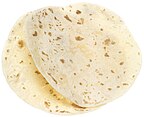Proposal:Shop=tortilla
| shop=tortilla | |
|---|---|
| Proposal status: | Proposed (under way) |
| Proposed by: | CENTSOARER |
| Tagging: | shop=tortilla |
| Applies to: | |
| Definition: | A shop selling tortillas to the public as the main product. |
| Statistics: |
|
| Draft started: | 2021-08-11 |
| RFC start: | 2024-04-25 |
Proposal
Use the tag shop=tortilla to map a shop selling tortillas to the public. Tortillas must be the main product sold in the shop, but other foods and tools related to tortillas may be found in these shops.
Secondly, identify the base grain used to produce these tortillas and tag with grain=maize or grain=wheat. Try not to make any assumptions, though, the reader of the map will probably assume the grain from their local context with a shop=tortilla without a grain=* key.
The revised entry for a tortilla shop
New tags to use in combination
| Key | Possible Values | Description | Product |
|---|---|---|---|
| grain | maize | Original tortillas are made from nixtamalized maize (see Corn tortilla on Wikipedia), but nowadays, the dough is usually made from corn flour.
While "corn" is used in the Wikipedia article, "maize" is the noun used in British English. |

|
| wheat | Wheat tortillas are also common in some places. These are called "flour tortillas" (tortillas de harina) in Mexico and the USA, but both are usually made from flour. | 
|
Rationale
Right now, we tag tortilla shops mostly as bakeries, and contributors regularly prepend the word Tortillería to the shop's name, description, or note. As of 2021-08-11, five POIs already use this tag, but due to confusion, contributors have mapped at least 450 tortillerías or tortilla shops as bakeries, generic shops (shop=yes), restaurants, fast food places, convenience stores, etc. This tagging system has been barely acceptable because a lot of tortilla shops specify they are tortilla shops in their name, but this is commonly not the case.
Tortilla shops are not really close enough to a bakery. The literal translation for “bakery” in Spanish is panadería, which refers explicitly to baked bread (pan), and has a whole different meaning than tortillería. Also, the tortilla shop element is not local anymore, they are common from the USA to Central America, probably also present in South America and Europe.
Most tortilla shops use an electrical machine called a tortilladora (a tortilla-maker machine) displayed at sight, customers usually can see or hear them working. Exhibition of the product to the public as in bakeries is not common practice, tortillas are just piled up somewhere inside the shop. Usually, customers don't buy by the piece but by weight, and they do not enter inside the shop. There's at least one employee weighting the product and charging customers on a bar at the entrance. Some more busy tortilla shops may have several employees at the bar and a whole team of others operating the machines or crafting the hand-made tortillas at sight if they are produced there. It is as far from a bakery or more than a pastry shop.
Tagging
- Elements tagged: nodes, areas and relations. Mostly and ideally as nodes placed on the main bar where they attend customers. Little buildings and relation-buildings can also represent a tortilla shop.
Handmade tortillas and other cases
Handmade tortillas are different from what most tortilla shops would sell, and some contributors ask how to tag these POIs. In the end, we would use shop=tortilla for those shops too, so, there's no need to create a specific key and value for this. The keys and values to indicate they are made by hand are currently open for discussion. The author of this proposal advocates for the use of food:tortilla=handmade because it is a tagging system already in use and documented in the wiki (see food:*=*), hence, it does not require the creation of additional keys. Other keys and values that could be used are already in the wild. These are among others:
- made_by=hand. Very rare, non-standard and undocumented.
- description=*. The good old almighty description key.
- tortilla=artisanal. Based on the use of ice_cream=artisanal but prone to grow out of hand with all kinds of values, probably obviating the proposed grain=* key.
- production=hand. It was mentioned in one discussion, would need to be created, but is not particularly compatible with the OSM tagging system.
There are bakeries where you can find wheat tortillas (see the table above), mostly packed in plastic bags. If so, it might be specified as a product sold there, similar to drinks in a bar, e.g. food:tortilla=wheat/packed. Also, there are convenience stores in the business of selling tortillas, these can be tagged as sells:tortilla=yes/maize.
Examples
See the table titled "The revised entry for a tortilla shop" in the Proposal section. A typical tortilla shop photograph is linked in the last column.
Rendering
I uploaded this icon that could be used to render this element type. The concept is of a tortilla-maker machine widely used in tortilla shops. There are three elements of the icon, the upper represents a deposit for the dough, the lower part tries to capture a conveyor, transporting tortillas. If the voting is favorable, the icon will be submitted to the OSM-Carto team.
Features/Pages affected
shop=tortilla would be created, Key:shop would be modified to list this key. A complementary grain=* would be created. It is expected that this grain=* key could be used outside the shop=tortilla domain.
External discussions
[RFC] Feature proposal - use shop=tortilla for tortilla shops and tortillerías on the OSM Community Forum.
Another thread with some insight here (Spanish, Mexico).
Comments
Please comment on the discussion page.
